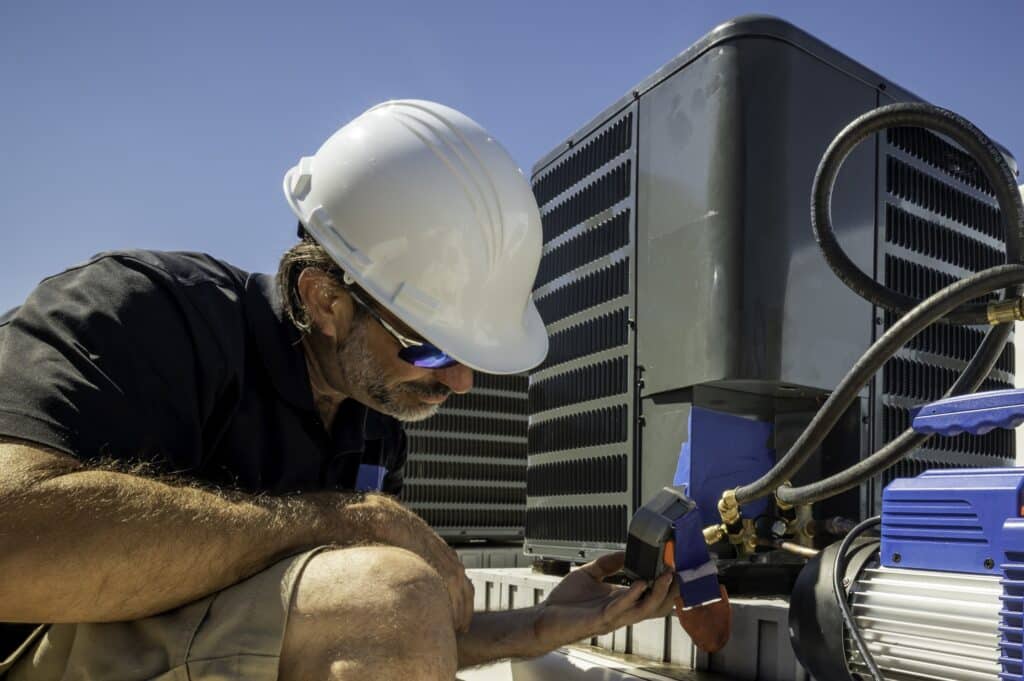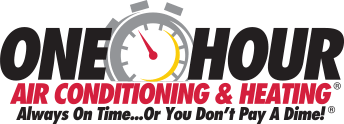
Preparing HVAC for Cold Spells in North Dallas
Preparing HVAC systems for December’s cold spells is crucial for homeowners in North Dallas. Sudden temperature drops test heating systems, and poor preparation can lead to breakdowns and higher energy costs. A reliable HVAC ensures consistent comfort and keeps your home protected from winter’s challenges.
One Hour Air Conditioning & Heating of Dallas stands as the trusted partner for efficient HVAC preparation. With unmatched expertise and a commitment to quality, they make winterizing your system hassle-free. Trust their professionals to ensure your HVAC operates at peak performance, keeping your family warm and worry-free during the cold season.
Recognizing North Dallas’s Unique Winter Challenges
Winter in North Dallas brings a unique mix of weather conditions, with sudden cold fronts, frosty nights, and unpredictable temperature swings. While the region avoids extreme snowfall, these fluctuations put a strain on HVAC systems that are not ready for the task. For homeowners, ignoring these challenges can lead to higher energy bills, uneven heating, and unexpected system failures at the worst times.
The dry air common during cold fronts can make heating less efficient, while rapid temperature changes increase the workload on your HVAC system. Homes with outdated or unmaintained systems often struggle to maintain comfortable indoor climates when the weather turns chilly. These conditions underscore the importance of preparing HVAC systems ahead of time.
Proactive HVAC maintenance is the best defense against North Dallas’s winter unpredictability. It ensures consistent warmth, reduces energy waste, and extends the life of your system. When you take steps to address these local challenges, you protect your home from discomfort and costly repairs. Recognizing and addressing the specific winter demands of the North Dallas climate is key to enjoying a worry-free, comfortable season indoors.
Importance of HVAC Maintenance Before Winter
Winter in North Dallas can be unpredictable, with sudden cold spells and fluctuating temperatures that place a heavy burden on your HVAC system. Preparing HVAC systems before the season’s chill arrives is not just about comfort—it is about protecting your home, saving money, and ensuring peace of mind. Without regular maintenance, your system may struggle, leading to uneven heating, higher energy bills, and unexpected breakdowns when you need it the most.
When you prioritize preparing HVAC systems, you ensure they operate at peak efficiency. Clean filters, properly calibrated components, and optimized airflow mean your home stays consistently warm without overworking the system. This proactive care extends your HVAC unit’s lifespan and significantly reduces the risk of costly repairs. Skipping maintenance, on the other hand, forces your system to work harder, wasting energy and increasing the likelihood of failure during the coldest days.
Professional inspections are an integral part of this preparation. HVAC technicians can identify and fix hidden issues, such as carbon monoxide leaks, loose connections, or damaged parts, that can compromise your family’s safety. Additionally, they ensure your system is ready to handle the unique demands of North Dallas winters, which often involve sudden cold fronts and fluctuating temperatures.
Do not leave your home’s comfort to chance. Preparing HVAC systems now means fewer surprises later, lower energy costs, and the reassurance that your family will stay warm no matter what winter throws your way. Investing in maintenance today ensures your home is ready for the season ahead.
Scheduling a Professional HVAC Inspection
Preparing HVAC systems for winter begins with scheduling a professional inspection. North Dallas winters are known for their unpredictable cold fronts and fluctuating temperatures, which can put significant strain on heating systems. A professional inspection ensures your HVAC unit is ready to handle these demands, reducing the risk of breakdowns and keeping your home warm and safe all season long.
Professional HVAC inspections go beyond routine maintenance. Experienced technicians thoroughly evaluate critical components, including the heat exchanger, furnace, thermostat, and blower motor. They detect potential issues like worn parts, airflow blockages, or loose connections that could compromise performance or efficiency. Addressing these problems early helps prevent costly repairs and ensures reliable heating when temperatures drop.
Safety is another critical benefit of a professional inspection. Technicians check for serious hazards such as carbon monoxide leaks or faulty electrical connections that could endanger your family. Additionally, they optimize the system for energy efficiency, ensuring consistent warmth while lowering energy consumption. Preparing HVAC systems in this way not only enhances performance but also provides peace of mind throughout the colder months.
Acting now to schedule an HVAC inspection ensures your system is ready to face North Dallas’s winter challenges. Avoid last-minute emergencies and enjoy a season of uninterrupted comfort by relying on trusted professionals to safeguard your home’s heating system.
Replacing or Cleaning Air Filters
Replacing or cleaning air filters is a fundamental part of preparing HVAC systems for winter. Despite its simplicity, this task has a powerful impact on your HVAC system’s performance, energy efficiency, and the comfort of your home. When the cold sets in, an unmaintained air filter can lead to unnecessary problems, from uneven heating to increased energy costs and poor air quality.
-
Boosting Energy Efficiency
Dirty air filters restrict airflow, forcing your HVAC system to work harder to heat your home. This increased workload not only raises your energy bills but also reduces the system’s overall efficiency. Replacing or cleaning air filters ensures that your system runs optimally, providing consistent warmth without overconsuming energy.
-
Preventing System Damage
Clogged filters strain the system by causing overheating and wear on critical components, such as the blower motor and heat exchanger. Over time, this added stress can lead to costly breakdowns. Preparing HVAC systems with routine filter maintenance protects your investment and extends your system’s lifespan.
-
Enhancing Air Quality
Winter often means sealed windows and doors, which reduce ventilation and trap indoor pollutants. Clean filters capture dust, allergens, and other particles, improving the air you breathe. For families with allergies, asthma, or other respiratory concerns, this is a critical step toward maintaining a healthy home environment.
-
Maintaining Consistent Heating
Restricted airflow caused by a dirty filter can result in uneven heating, leaving certain areas of your home colder than others. Regularly replacing or cleaning filters ensures balanced airflow and consistent comfort throughout your home during the winter.
-
Simple Maintenance, Big Results
Preparing HVAC systems with clean filters is a small task with significant benefits. Changing filters every 1-3 months prevents operational issues, improves system performance and reduces the risk of costly repairs.
Ensure a warm and cost-efficient winter by keeping your filters clean. Regular maintenance prepares your HVAC system for the season, offering consistent comfort, enhanced air quality, and peace of mind.

Thermostat Settings for Energy Efficiency
When preparing HVAC systems for winter, thermostat settings play a crucial role in ensuring energy efficiency without sacrificing comfort. Strategic thermostat management not only reduces energy bills but also keeps your HVAC system performing optimally, especially during North Dallas’s unpredictable cold spells. By making thoughtful adjustments, you can achieve consistent warmth and extend the lifespan of your heating system.
Set the Ideal Temperature
The U.S. Department of Energy recommends maintaining your thermostat at 68°F while at home during the day. This temperature is warm enough for comfort but keeps energy consumption low. When you are asleep or away, lower the setting by 7-10°F to reduce heating costs by as much as 10% annually. Preparing HVAC systems with these minor adjustments can yield major savings.
Utilize Programmable Thermostats
A programmable thermostat eliminates the need for constant manual adjustments. You can schedule temperature changes to match your daily routine, such as lowering the heat while you are at work and warming your home just before you return. This ensures energy is only used when needed, optimizing efficiency and convenience.
Invest in Smart Thermostats
Smart thermostats enhance energy savings by learning your habits and preferences. They automatically adjust to your schedule and allow remote control through your smartphone. Advanced features like energy usage insights help you refine your settings to make your HVAC system more efficient. Preparing HVAC systems with smart thermostats provides a modern and impactful way to cut costs.
Avoid Extreme Changes
Setting your thermostat to a high temperature does not warm your home faster—it only wastes energy. Instead, maintain consistent settings to avoid overburdening your HVAC system.
Use Zoned Heating Systems
If your home has a larger footprint, consider zoning your heating system. This approach directs warmth to the areas you use most, saving energy by avoiding unnecessary heating in unused spaces.
By preparing HVAC systems with smart thermostat management, you can enjoy a warm, comfortable home while keeping energy consumption in check. These simple adjustments make a significant difference, providing comfort and efficiency all winter long.
Sealing and Insulating the Home
Sealing and insulating your home is one of the most impactful ways to support your HVAC system and reduce energy waste during winter. Even a well-maintained HVAC system struggles to keep up if heat constantly escapes through drafts and poorly insulated areas. By addressing these vulnerabilities, you not only enhance your home’s warmth but also improve energy efficiency and reduce heating costs.
-
Spot the Trouble Areas
Heat loss most commonly occurs around windows, doors, attic spaces, and hidden gaps in walls or floors. Drafts can sneak in through poorly sealed door frames, window panes, or cracks in the foundation. Inspect your home thoroughly, feeling for drafts on cold days or using tools like thermal imaging cameras to pinpoint problem areas.
-
Seal the Drafts
Sealing drafts is a simple yet effective solution. Apply weatherstripping to windows and doors to block air leaks. Use caulking around window frames and gaps to create a tight seal. For doors, install door sweeps to eliminate drafts from beneath. These small adjustments make a big difference when preparing HVAC systems for efficient performance.
-
Upgrade Your Insulation
Proper insulation acts as a protective barrier against heat loss. Focus on the attic, walls, and crawlspaces, as these areas contribute significantly to temperature fluctuations. If insulation is thin or outdated, upgrade to energy-efficient materials. Attic insulation is especially important since heat naturally rises and escapes through uninsulated roofs.
-
Address Hidden Gaps
Heat can escape through less obvious places, such as gaps around electrical outlets, recessed lights, and plumbing fixtures. Use foam sealants, outlet gaskets, or specialized covers to close these hidden escape routes and retain heat inside.
-
Support Your HVAC System
A well-sealed and insulated home reduces the workload on your HVAC system, allowing it to operate efficiently without overexertion. This translates to lower energy bills, consistent indoor temperatures, and a longer lifespan for your heating equipment.
Preparing HVAC systems for winter starts with creating a home that retains heat effectively. By sealing and insulating properly, you set the foundation for a warmer, more energy-efficient home while keeping heating costs under control.

Preparing Outdoor HVAC Units
Preparing outdoor HVAC units for winter is essential to maintaining reliable heating and preventing costly damage. Outdoor systems are exposed to harsh elements like snow, ice, and debris, making them vulnerable to inefficiencies and breakdowns. Taking proactive steps not only protects your HVAC unit but also ensures efficient operation throughout the season.
Clear Debris and Ensure Cleanliness
Debris such as leaves, dirt, and branches can obstruct airflow and hinder your HVAC system’s performance. Remove all debris from around the outdoor unit, and clean the coils and fins using a soft brush or low-pressure hose. Preparing HVAC units by ensuring they are clean improves efficiency and reduces the risk of system strain.
Inspect the Unit for Damage
Carefully inspect the unit for cracks, bent fins, or loose wiring. Identifying and fixing these issues early is crucial for preparing HVAC systems to handle the demands of winter. If you find significant damage, schedule a professional inspection to address potential problems.
Cover the Unit Properly
Use a breathable, weatherproof cover to shield your unit from snow and ice while preventing moisture buildup that can cause rust or mildew. Avoid using plastic tarps, which can trap condensation. Covering your unit adds a protective layer when preparing HVAC systems for harsh winter conditions.
Trim Nearby Vegetation
Trim back shrubs, trees, or overgrown vegetation around the unit to maintain at least two feet of clearance. Proper airflow is vital for your system’s efficiency, and clearing surrounding areas helps prevent debris from causing damage during storms.
Turn Off Power (If Applicable)
If the unit will not be used during winter, turn off its power supply. This prevents accidental activation and reduces wear during freezing weather.
By preparing HVAC systems with these steps, you protect your outdoor unit, enhance energy efficiency, and ensure reliable performance throughout winter. Proactive care minimizes repairs and extends the lifespan of your HVAC system, keeping your home comfortable and stress-free.
Emergency Preparedness for HVAC Failures in Dallas, TX
In Dallas, TX, winter HVAC failures can disrupt comfort and even pose safety risks during sudden cold fronts. Preparing HVAC systems for emergencies is essential to ensure your home stays safe and warm, no matter the circumstances.
Keep a Reliable HVAC Service on Speed Dial
Choose a trusted HVAC company in Dallas, TX, that offers 24/7 emergency services. Quick access to professional help ensures your heating system is restored promptly, minimizing discomfort and potential damage.
Invest in Backup Heating Solutions
Portable space heaters provide an immediate source of warmth during an HVAC failure. Select safe and energy-efficient models to keep critical areas of your home comfortable.
Ensure Proper Insulation
Well-insulated homes retain heat better, reducing the impact of HVAC downtime. Sealing drafts and adding insulation to attics and crawlspaces are key steps for Dallas homeowners preparing HVAC systems for winter.
Install Carbon Monoxide Detectors
Gas HVAC systems can pose carbon monoxide risks during failures. Install detectors throughout your home and test them regularly to keep your family safe.
Assemble an Emergency Kit
Include blankets, flashlights, batteries, and bottled water in a kit. This helps Dallas residents remain comfortable while waiting for HVAC repairs.
Through proactive HVAC maintenance and well-thought-out emergency plans, Dallas homeowners can confidently navigate winter HVAC failures, ensuring safety and warmth with minimal stress.
FAQS About Preparing HVAC
-
How often should I perform HVAC maintenance in winter?
Preparing HVAC systems for winter requires an annual professional tune-up before the season starts. This ensures your system operates efficiently and reduces the likelihood of breakdowns during extreme cold. If you notice uneven heating, strange noises, or rising energy bills, schedule an additional inspection to address potential issues early.
-
What is the ideal winter thermostat setting to save energy?
Set your thermostat to 68°F while at home and awake. Lower it by 7-10°F at night or when you are away. This simple adjustment can reduce heating costs by up to 10% annually. Using programmable or smart thermostats makes preparing HVAC systems for energy efficiency easier by automating temperature changes.
-
How do I know if my HVAC system needs repairs during winter?
Signs include uneven heating, frequent cycling, or unusually high energy bills. Unusual noises or weak airflow can also indicate a problem. Preparing HVAC systems for reliability includes addressing these warning signs promptly to avoid unexpected failures.
-
How can I improve indoor air quality during the winter months?
Replace air filters every 1-3 months to remove dust, allergens, and pollutants. Sealing drafts and adding insulation helps keep outdoor contaminants out. Adding a humidifier or air purifier further enhances indoor air quality, making your home more comfortable during winter.
-
What should I do to protect my outdoor HVAC unit in freezing weather?
Clear debris from around the unit and use a breathable, weatherproof cover to protect it from snow and ice. Turn off power to the outdoor unit if it will not be used during winter to prevent accidental activation and freezing damage. Preparing HVAC systems with these precautions ensures long-term reliability.
Preparing HVAC systems for winter ensures your home stays warm, efficient, and safe. One Hour Air Conditioning & Heating of Dallas is here to provide expert, dependable HVAC service. Contact us today and let our professionals ensure your system is ready for a worry-free winter season!







